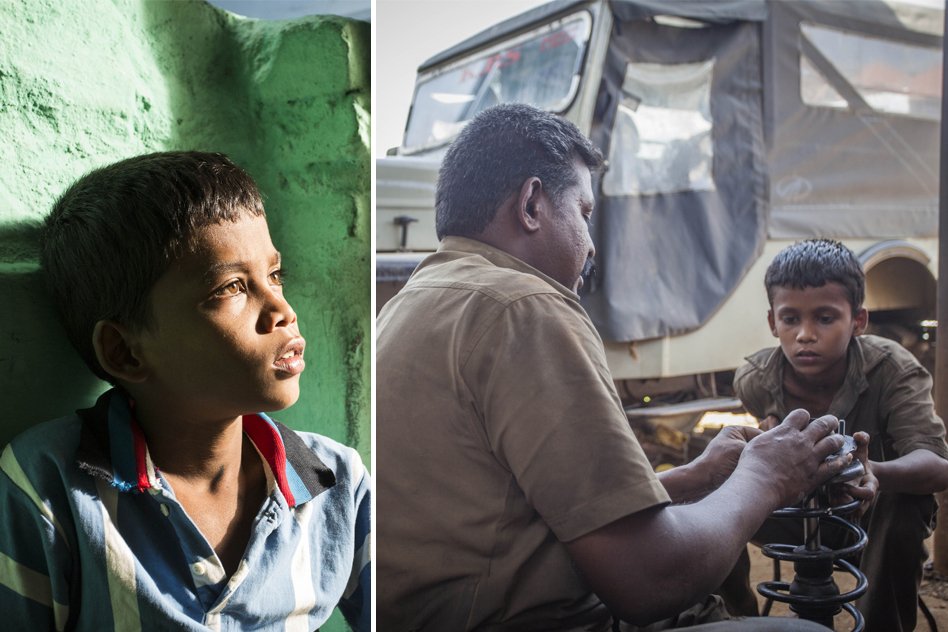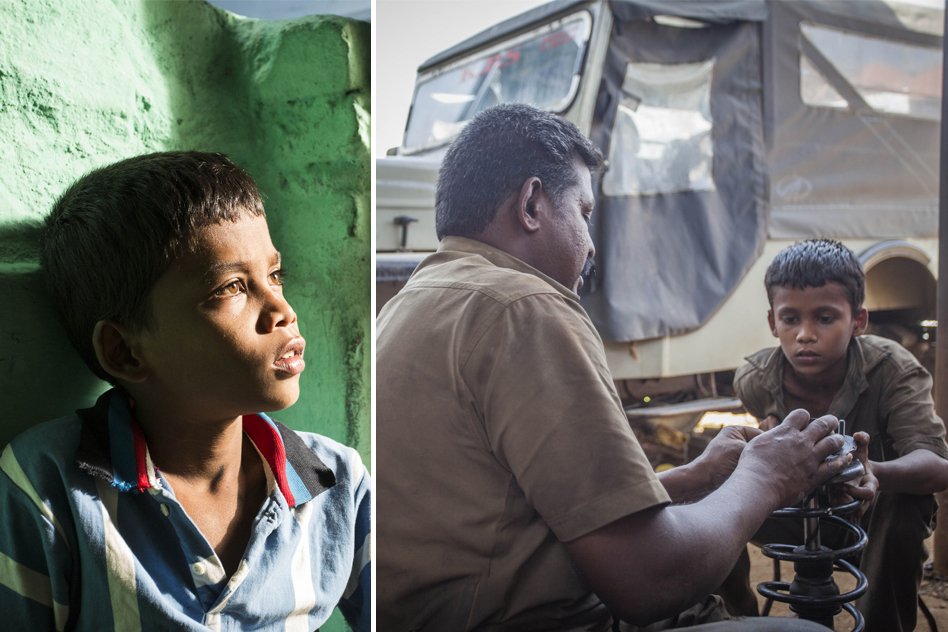“His father abandoned them when he was six years old. He has a younger sister and a brother. Their financial situation is dismal. I pay him Rs 100 a day. That’s all I can afford. Mari collects every paise of his earnings and gives them to his mother. He is a very bright boy and he can do a lot more than what is generally expected of a boy his age. He is unusually mature and calm. Sometimes, I forget that he is just a young boy,” said Khaja, owner of an automobile workshop in Bodhinayakanur, as he looked at the young boy. Dressed in a worn out brown shirt with grease and oil stains, he was hunched over staring intently at the engine of a car that was just brought in for repair. His name was Mari.
Apparently, he just showed up at Khaja’s doorstep a year ago and expressed his desire to learn the tricks and trade of becoming a mechanic. However, Khaja was taken aback and told him to go away since he was too young to be working in a garage. But nothing could deter this lad from pursuing what he longed to do. Burdened with responsibilities, he was adamant about learning the skills required and Khaja eventually decided to take him in. The clarity and determination he had for a 14-year-old boy was quite remarkable. However, his ideas and aspirations stemmed from what he was only exposed to so far. Growing up without a father, Khaja had now become a father figure to him. Therefore, his dreams of a better life included running his own garage someday. This is all he knew and all he wanted from his life. This was his reality. We were quite certain that if Mari had the right access to education or exposure within the automobile field, he could outshine his peers. Khaja also told us that if he was still alive when Mari turns 20, he will hand over the garage to him.
The moral dilemma of child labour

In the afternoon, our discussions steered towards child labour laws in the country. It is easy for us to pass judgement and opinions on how immoral it is for a child to be embroiled in the ethical debate. However, everything is not as black and white as it seems. We have to understand the circumstances that forced kids to take up menial jobs to support their families. Sometimes it is to lend a helping hand to their mothers. Sometimes, it helps them put food on their tables.
According to the Child Labour (Prohibition and Regulation) Act of 1986, children up to the age of 14 cannot be employed in hazardous occupations. Although, the initial amendment proposed complete prohibition of employment of children below 14 regardless of occupations and processes involved, the current government has given the green signal to employ them in ‘family-run’ enterprises. The list of such ‘organisations’ could include domestic help, street vending, rolling beedis, working in sweatshops, dhabhas, etc.
Rather than addressing these issues fundamentally, the government is trying to provide capsule-sized solutions that only further aggravate the problem. There are numerous socio-economic and demographic factors that propagate child labour in any society. However, two of the most crucial determinants that perpetuate this practice are extreme poverty and lack of social security. In an attempt to augment family income, children are forced to seek employment at a young age. Moreover, the absence of any measures to strengthen economic stability within their families has only impaired the situation.
The worst affected are those who are trying to make ends meet. With kids like Mari who had to become the man of the house at the age of six, taking away his only means of survival would have a disastrous effect on the financial situation of his family. If child labour is to be banned altogether, then alternate provisions should be provided to the family to safeguard all concerns with respect to sustainable income and education. It is imperative that we look deeper into the lives of these kids and ensure a better future for them. And, in Mari’s case, it would be morally wrong for us to judge him for the life he has chosen. Moreover, he cannot be banned from making a living for himself and his family.
(to be continued)…
This story is an effort by The Logical Indian in collaboration with Rest Of My Family towards bringing stories which need much attention.
Submitted By – Akshatha Shetty | Photo Credit – Piyush Goswami
















